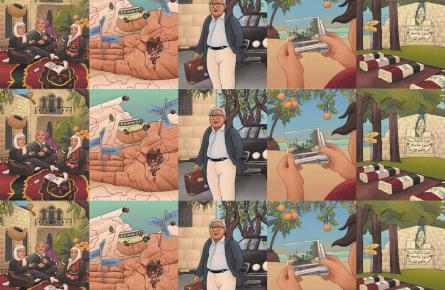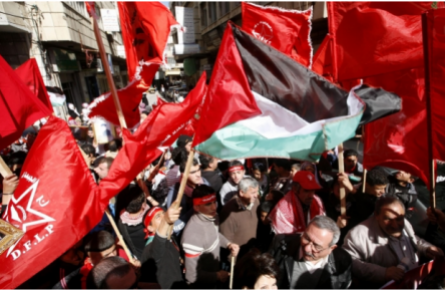On Monday, February 11, Congresswoman Ilhan Omar (D-MN) was pressured to apologize after her tweet highlighting the disproportionate influence of the Israel lobby was met with a bipartisan wave of anti-Semitism accusations. Omar directed her legitimate criticism against the American Israel Public Affairs Committee (AIPAC), which has historically played a significant role in securing U.S. military aid and bipartisan support for Israel. Although her comments have sparked a long overdue discussion about the role of pro-Israel interest groups in U.S. politics, the controversy is also an opportunity to highlight an equally important issue: police exchange programs between the U.S. and Israel. These programs are closely coordinated between the Israeli government a number of groups such as the Anti-Defamation League (ADL), AIPAC, and the Jewish Institute for National Security Affairs, among others.
Since 2004, the
Anti-Defamation League has arranged
for 200 U.S. police executives and officers to participate in police exchange
programs with Israel.
This relationship not only legitimizes the Israeli occupation of Palestinian
land, but it also introduces U.S. police forces to new, discriminatory
techniques that they often disproportionately deploy against communities of
color.
In response to these
exchange programs, racial justice grassroots organizers in the U.S. have recognized
that global white supremacy underlies both police brutality in the U.S. and
Israeli occupation of Palestine. Hence, a number of campaigns that adopt an
approach that exposes the nexus of violent policing and Israeli apartheid.
Police exchanges with Israel earned notoriety in 2014 after Ferguson police officer Darren Wilson shot and killed Michael Brown, an unarmed African-American man. In the aftermath of Mr. Brown’s murder, thousands of people protested against police violence and were met with such brutality that renowned scholar Angela Davis compared Ferguson to the Gaza Strip. The police violence at these protests was led by St. Louis Police Chief Tim Fitch, who in 2011 attended the National Counter-Terrorism Seminar (NCTS) in Israel, a training program inaugurated by the ADL.
[An Error of Omission: The Congressional Research Service and Israeli Settlements]
According to an itinerary for a seminar held in 2016, the NCTS included lessons led by
officials from the Israeli Airport Security, the National Police, and the Shin Bet – the Israeli Security Agency, among others. According to Amnesty
International, each of these groups continues to engage in practices that
constitute systematic discrimination, if not outright violations of human rights.
Jewish Voice for Peace
(JVP) launched a campaign to end the “Deadly Exchange,” which supports
grassroots efforts that engage local legislatures and police forces. Community
organizations have begun to demand accountability from their police departments
by framing human rights in Palestine as an issue of racial justice that is
inseparable from challenging police violence in the U.S.
On April 16 of last year, Durham, North Carolina, mobilized around this intersectional nexus and became the first U.S. city to legislate against Israeli police exchanges. Its City Council ratified a statement that banned any training of Durham police by a foreign entity, including Israel. This step is particularly important, since two Chiefs of Police in Durham had been involved in previous Israeli training seminars. The statement was endorsed and promoted by a coalition called Demilitarize from Durham2Palestine, which includes eleven groups that advocate for the rights of Black U.S. citizens, migrants, Muslims, and Palestinians.
According to Lama Abu Hantash, an organizer at Duke University Students for Justice in Palestine (SJP), police exchanges are related to both the Durham community and Palestine. This link is more than a symbolic display of solidarity. In 2017, Black Durhamites were issued 83 percent of traffic stops despite comprising only 40 percent of the city’s population. They have a powerful reason to object to police exchanges with Israeli Airport Security, which has admitted to racially profiling Arab travelers. Similarly, undocumented Latinx migrants in the city, many of whom were threatened by Israeli technology at the U.S. Southern border, are also targeted by Immigration and Customs Enforcement (ICE), which is led by Deputy Director Peter Edge, who received training in Israel.
[U.S.-Mexico Border: An Israeli Tech Laboratory]
In the U.S., racist and
violent policing has historically served to reinforce
white supremacy. Similarly, Zionism, as a settler colonial ideology, shares
this racialized hierarchy. The discriminatory tactics traded during police
exchanges is a reflection of these common racist roots.
Several nationwide campaigns have since then followed Durham’s lead,
including Occupation
Free D.C. (OFDC),
which was formed in 2017 by the Washington, D.C., chapter of JVP.
Current D.C. Metro
Police Chief Peter Newsham recently sent Commander Morgan Kane to attend the NCTS in Israel. His participation in this program
was condemned by D.C. Councilmember David Grosso, who noted that learning from people whose approach to conflict
resolution is violence is not
the correct direction for D.C. law enforcement. Moreover, programs like the NCTS are likely illegal under the D.C. Human Rights Act of 1977, which prohibits coordination between public
institutions in Washington and any entity that engages in racial
discrimination. The primary goal of OFDC organizers is to mount pressure on the
city government so that a
third party is granted the authority to review all organizations with whom the
Metro Police Department train.
Their objective is endorsed by sixteen community organizations in Washington. Like their peers in Durham, D.C. advocates for Palestinian human rights have increasingly emphasize the intersection between racial violence in the U.S. and the brutality of the Israeli occupation in Palestine. According to Chase Carter, a member of the JVP D.C.-Metro Steering Committee, OFDC has advanced through coordinating with groups that oppose mass incarceration, violence against migrants, and islamophobia. OFDC organizers canvassed with Black Youth Project 100, an organization dedicated to racial justice action and education. They also raised money to support the full funding of a public health-based police reform legislation that was supported by the Stop Police Terror Project-D.C. Carter points out that by organizing to support this legislation, OFDC was able to not only support groups led by people of color, but also promote “the kind of solutions that [they] want to see instead of police exchange programs.”
Carter is confident that
intersectional organizing is at the core of the campaign’s effectiveness. He
echoes Abu Hantash’s view that “the powers that are oppressing people here in
the U.S. and in Israel/Palestine are emboldening each other, and only through
emboldening our movements collectively will we be able to fight that.”
The intersectional
coalition-building strategy employed in these campaigns is ultimately a way of
building a vision of public safety that is opposed to violence, whether by U.S.
police forces or the Israeli occupation.
According
to Abu Hantash, ending police coordination between the U.S. and Israel is
ultimately a challenge to build a “global citizenry” as a means of ending
racial inequality and challenging the role that these programs play in
militarizing communities.




